In the first episode of “3 Keys to Raise Quran-Loving Kids”, we invited parenting expert Kathryn Jones to share her expertise and experience.
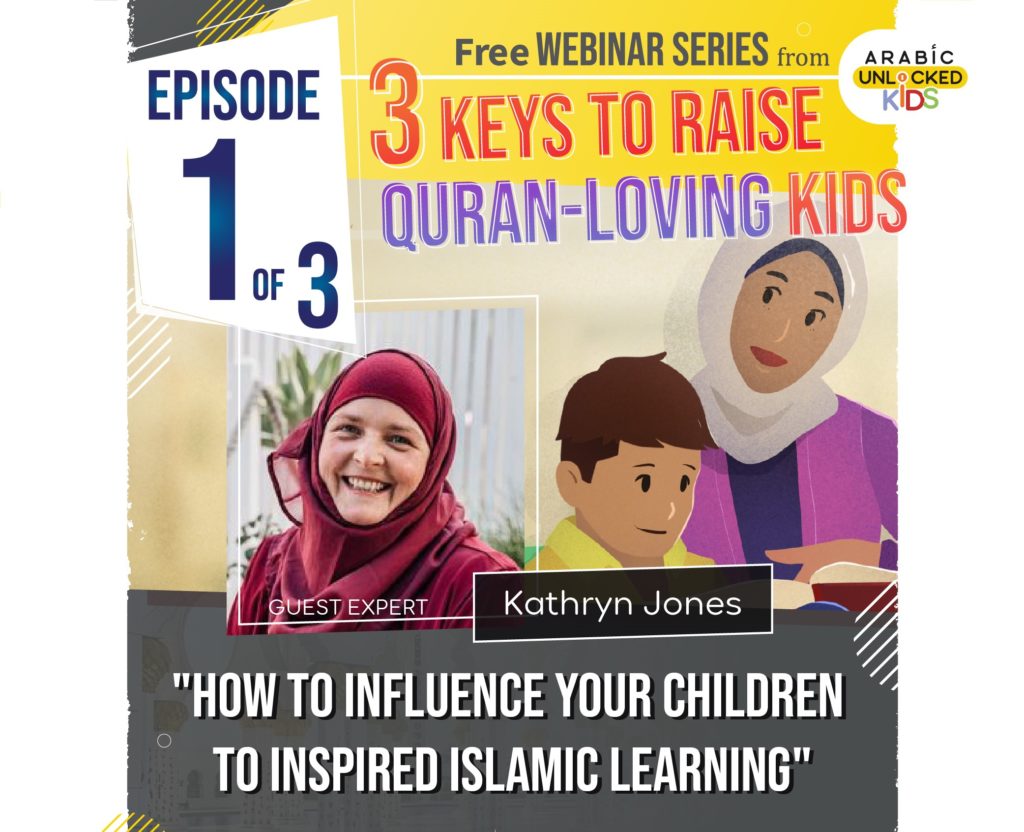
About Kathryn Jones
Kathryn Jones is an author at Parenting for Paradise and the CEO and founder of Back to the Fitrah Mentoring Academy.
Kathryn is also known as the Peaceful Parenting Coach and has taught hundreds of parents, particularly Muslim parents, how to step into the parenting role with confidence, compassion, and inner calm.
She is a mother of five and stepmother to two children. She has been a parent for the last 26 years and has raised four teenagers to adulthood with two teenagers in the making and an 11-year-old on his way. MashaAllah.
In this article, we summarise and share the key highlights from Kathryn’s episode, “How to Influence Your Children to Inspired Islamic Learning”.
.
What You’ll Learn in this Article
- How to inspire children towards Islamic learning rather than it being the grind that so many parents struggle with.
- The three attributes every parent needs to have to nurture the fitrah of their children.
- The components of peaceful parenting so you can show up as the parent you can be.
.
Author: Kathryn Jones
We are All Born with an Intrinsic Motivation to Learn
Let me begin with the fact that all babies are born in a state of intrinsic motivation to learn. Anyone who has ever observed a young baby grow will see how they are completely content staring up at these beautiful hands Allah SWT has created. And they spend numerous hours wiggling those fingers, getting the hang of the hand-eye coordination.
Nobody is teaching them how the eyes and their hands work together. They just instinctively learn. And when they start learning to walk, you see their patience, perseverance, and determination to take step by step, no matter how many times they fall.
This motivation to learn is innate in all of us, but somewhere along the way our desire to learn has been upset. In the same way, every child is also born in a state of belief in Allah. This innate nature is called our fitrah.
However, our environment and upbringing can disrupt and bury our fitrah. We see this reflected in the hadith:
Abu Huraira reported: The Prophet, peace and blessings be upon him, said, “No child is born but that he is upon natural instinct. His parents make him a Jew, or a Christian, or Magian. As an animal delivers a child with limbs intact, do you detect any flaw?” Then, Abu Huraira recited the verse, “The nature of Allah upon which he has set people,” (30:30).
One of the key lessons we can learn from this hadith is just how important it is to protect a child’s fitrah during their upbringing.
So if a child is intrinsically motivated to learn, then what we need to do is nurture that in the direction of loving Allah, the Prophet SAW, and Islam.
.
The 3 Attributes that Nurture the Fitrah of Children
There are three attributes that every parent needs to have in order to nurture the fitrah of children and be able to influence our children towards inspired Islamic learning. These attributes are:
- Taqwa
- Tarbiyyah
- Tawakkul
With respect to parenting, this means having consciousness of Allah (which is taqwa) to nurture a soul towards Allah (which is tarbiyyah) with full trust in Allah (which is tawakkul).
However, I see many parents struggle to attain the right balance of taqwa, tarbiyyah, and tawakkul when it comes to parenting. So I just want to unpack what’s going on and share with you a few models on how we can influence our children towards inspired Islamic learning.
.
Getting Stuck in the “Lost” Quadrant
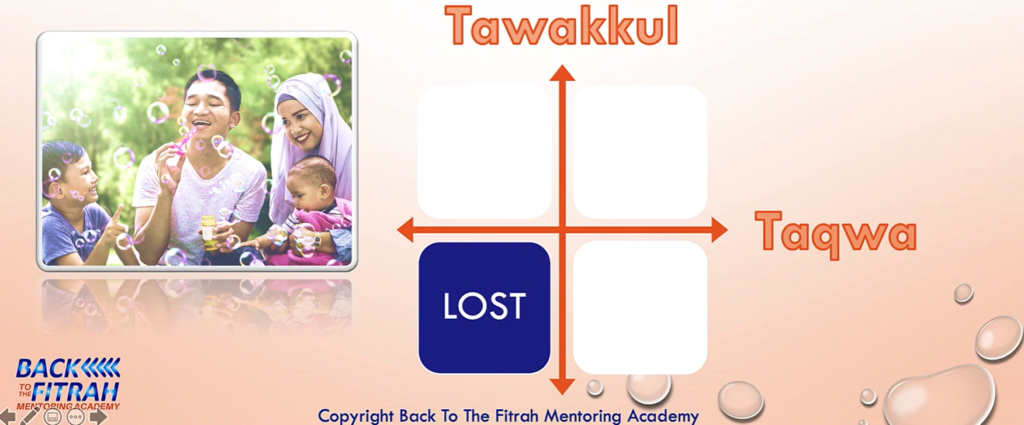
.
With all the different parenting advice out there, it’s very easy for a parent to find themselves in the lost quadrant. And I’ve certainly been in this quadrant many times.
What tends to be happening when we are solidly in that lost quadrant is that we’ve certainly lost sight of tawakkul. We’ve lost sight of trusting Allah and we’re desperately looking for solutions or answers to our problems.
We may even be at our wit’s end. It may also show in our behaviour that we’ve lost our consciousness of Allah because we may say or do things that we really regret and wish we could do differently, SubhanAllah.
.
Getting Stuck in the “Fear” Quadrant
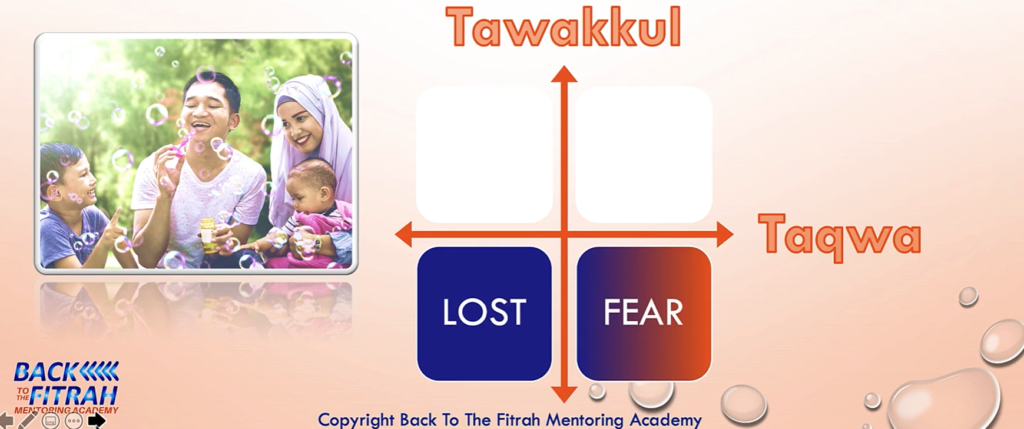
.
In this quadrant, we definitely have consciousness of Allah. We’re very aware of our responsibility to teach our children about the Quran, to encourage them to pray, and to nurture them to grow up into the Muslims that they should be.
However, in this quadrant, there is a lack of or low levels of tawakkul. Instead of trust in Allah, there is a lot of fear. We are scared we’re going to mess it up. We think, if my child hasn’t memorised the entire Quran by this particular age, then there’s something wrong with me.
We start comparing our children to others. We think, oh that person’s child is younger than mine yet they’ve memorised more Quran than my kid. Or maybe our child has memorised it but now we can’t get them to revise it.
When all these fears come up, we become very stressed and anxious. And as result, what tends to happen is we become quite controlling. We become forceful and rigid. We start applying a lot of consequences because they are not performing the way they were meant to perform.
The problem with this is we’re actually pushing our kids away from Islam. We’re also pushing them away from their intrinsic motivation to learn because we’re now adding this extrinsic motivation through fear.
Thus, instead of tapping into their fitrah to intrinsically learn about Allah, we are motivating them through consequences. We’re telling them if you don’t do what you’re meant to do, then you won’t get this or enjoy the privilege you want.
This can make them resent learning about Islam because they associate it with consequences. So fearful parenting is not a really good place to be.
.
Getting Stuck in the “Hopeful” Quadrant
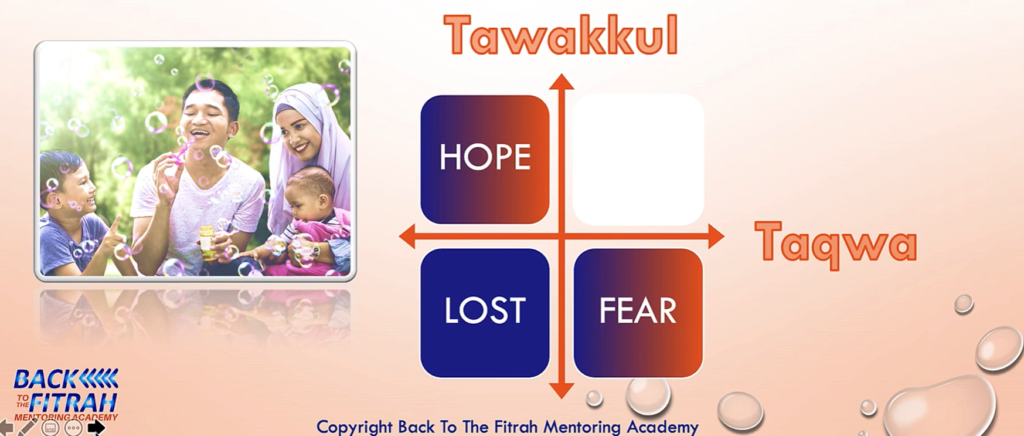
.
In this quadrant, there’s a lot of tawakkul — the trust in Allah that everything will be alright. However, there low levels of taqwa through the tendency for complacency around the outcomes.
We don’t really have a clear direction or purpose in terms of guiding children towards Allah. We just hope that everything will work out. We think that because Allah guides whom He chooses to guide, that there isn’t any responsibility on our part. The problem with this is that we forget that trusting in Allah comes with “tying the camel” as well.
Another problem in this quadrant is there can be a lot of rewards. Rewards are the opposite of the consequences in the fearful quadrant. We are hopeful the rewards will motivate our children to behave the way we want to.
Many parents don’t realise that rewards can be just as damaging as consequences. In fact, a book by Alfie Kohn called “Punished by Rewards” states how rewards are another form of extrinsic motivation that rob children of their innate and intrinsic motivation to learn.
So when we’re stuck in the fearful or hopeful quadrant, we’re not being an inspiration for our children. We’re in fact demotivating them and they now need something external to be motivated.
This problem becomes more pronounced in the teenage years. Punishing a 14-year-old teenager to take a time-out is just not going to work. While what teenagers demand to get as rewards can be unrealistic or out of our reach.
So what’s the solution? We need to move into the fourth quadrant that is high in both taqwa and tawakkul.
.
Shifting into the “Love” Quadrant
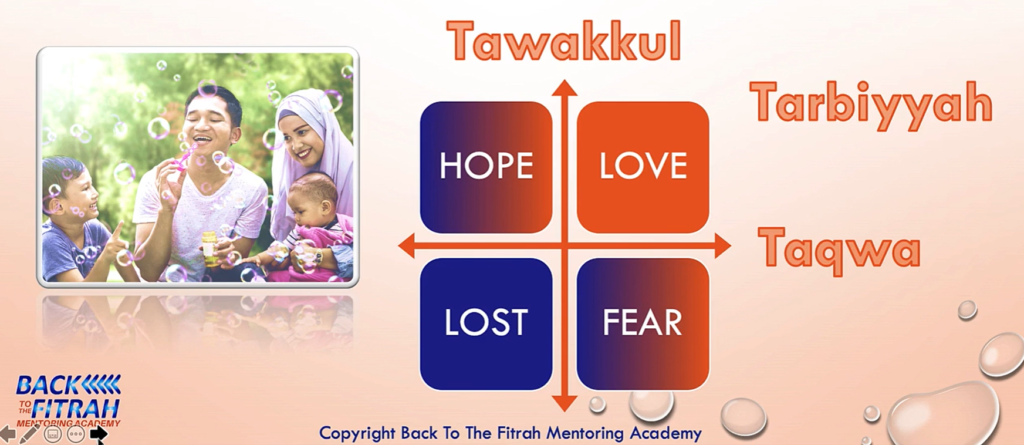
.
Where we really need to be is in the love quadrant, which is a beautiful balance between taqwa and tawakkul. This balance enables tarbiyyah.
In the Love Quadrant, there is:
- Consciousness of Allah; and
- Our duty to step up to the plate and be the best possible example for our children; and
- Our responsibility to parent them in the best possible way that we can;
- Yet trusting that the outcome is in Allah’s hands.
In this quadrant, we’re not focused on outcomes driven by our fears or hopes. We’re focused on the best result that can come from Allah.
So if our child isn’t naturally good at the Quran but they put in their best effort and managed to memorise some verses instead of the whole Juz, then that is fantastic because they’ve done their best. And we’ve done our best to support them.
If they’re naturally inclined to memorise the Quran easily, then that’s great too. But maybe it didn’t take much effort on their part to do that. And so maybe it makes sense that Allah SWT says that the reward is doubled for the one who struggles with the Quran compared to the one who doesn’t.
When we come from the love quadrant, we begin to parent with tarbiyah — that soul-to-soul connection; a fitrah-to-fitrah connection with our children. It is from this loving, beautiful, caring space that you inspire children towards that natural intrinsic learning of Islam, the Quran, Arabic, and the things we really want our children to learn and embody.
.
The 3C’s of Peaceful Parenting
Let’s now explore how we can show up with taqwa, tarbiyyah, and tawakkul in our parenting and how it works. The components you need are the three C’s to peaceful parenting, which is confidence, compassion, and calm.
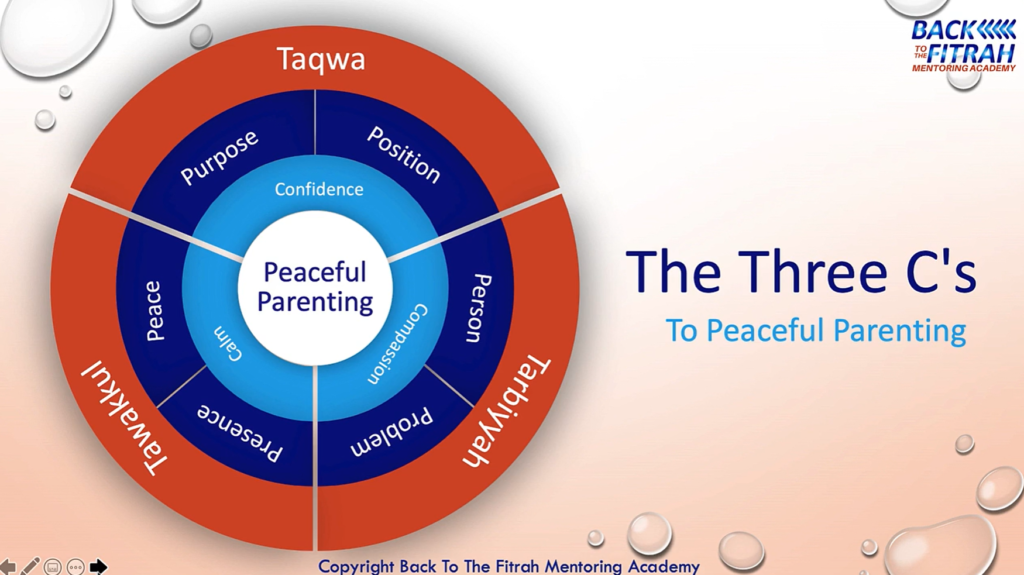
.
Confidence
Our confidence comes from being in our purpose and being aware of our position.
Our purpose is to worship Allah alone and to do so in a manner that is pleasing to Allah. So when it comes to parenting, as long as our intention is for the sake of Allah, and we do it in a manner that’s pleasing to Allah, then our parenting is an act of worship that fulfils our purpose.
Our position is the state we’re in. For example, if our emotional state is stressed, depressed, anxious, or fearful, it can actually affect our purpose. This is because we tend to shift away from pleasing Allah and move towards doing anything that will make us feel better. It is in this state that we are more likely to do and say things that aren’t pleasing to Allah. Thus, being aware of our position helps us maintain our purpose.
When we have both awareness and consciousness of our purpose and position, then we are in a state of confidence. Because if you’re doing something for the sake of Allah, and you’re doing it in a way that’s pleasing to Him, why wouldn’t you be confident?
This means we also have a good relationship with Allah which puts us in a state of taqwa in everything we do, especially when we’re parenting our children.
.
Compassion
Compassion can be the relationship we have with others or ourselves. In this case, we’re talking about our relationship with others.
Many of us struggle to differentiate between the person and the problem. When we see the person as the problem, we lose compassion.
In terms of parenting, we might see our child’s behaviour as problematic and causing us grief. Perhaps we’re feeling distressed because our child hasn’t been completing their homework. We keep nagging them to do it but they won’t because they are addicted to that computer game. Sounds familiar?
When we can’t differentiate between the person and the problem, we start to see the child as the reason we feel distressed, overwhelmed, and maybe even at our wit’s end. When the truth is their behaviour isn’t the problem that’s causing our feelings. Their behaviour is actually a symptom of the problem.
Negative behaviour is a symptom that tells us something’s going on for them. When we realise this, we can actually tackle the real problem. Thus, once we begin to see the person as separate from the problem, the compassion will naturally emerge.
This doesn’t mean we don’t set limits. Absolutely, we must set limits if the behaviour is dangerous or it’s gone too far. But we do it in a compassionate, respectful, and firm way, InshaAllah.
.
Calm
The last C is for calm. Inner calm is actually our relationship with ourselves. It’s not something that comes when everything in life is perfect. Rather, inner peace comes when we’re being present in the moment. We’re not stuck in the past or anticipating the future. We’re not churning over the fact that yesterday my child behaved badly and anticipating they will behave badly today.
If we’re caught up in the past or the future, we can become blinded to what’s really happening in the present. Perhaps our child is really ready to show up and be the child that we want them to be, but before they can do that, we react by giving them consequences for something they did yesterday. By not being present and giving them the space to intrinsically show up, we’ve spoiled it.
By being present in the moment, we may actually notice how hard our child is actually trying. Showing up from this state of presence can become a completely different experience of peaceful parenting.
The other aspect of inner calm is peace of mind. I like to call this “slowing down to the speed of tawakkul”. When we simply place our full trust in Allah, knowing that everything in the past and everything in the future is for the best, then we can have peace of mind.
Together, presence and peace of mind give us the inner calm we need to complete the peaceful parenting approach.
.
In Action: Parenting with Taqwa, Tarbiyyah & Tawakkul
So I want to share a story from my own experience with my daughter, Soukaina.
For context, I’m an Australian who accepted Islam when I was 26 years old, Alhamdulillah. My children are half-Australian and we live in Australia. At first, I sent my children to an Islamic school. However, when Soukaina was in Year 2, the school had many problems.
One of the issues was when a Year 2 boy had threatened another child in Soukaina’s classroom with a knife. Soukaina and my other kids were also being bullied because I was Australian, and there was a heavy anti-Australian racist sentiment amongst some of the kids in that school.
The psychological impact this had on my kids led me to conclude that this environment is just not healthy for them, so I placed my children in a public school. Alhamdulillah, the behaviour management at the public school was great initially. However, after September 11, the growing Islamaphobia meant my kids were treated differently because they were Muslim.
Soukaina had started wearing her hijab in primary school. But when she got to high school, all the comments and slurs made her really nervous about it. So she took off her hijab, stopped praying, and essentially didn’t identify herself much as being Muslim.
I always checked in with my kids through these phases as to where their heart was, and Alhamdulillah, their heart was always still with Allah. However, their behaviour certainly wasn’t showing that in all three of my older kids.
I was really conscious not to go into the fearful quadrant. Sometimes I did. I understand it’s hard not to. So occasionally I would slip into that. I was also really conscious not to go into the “oh well, hope for the best” quadrant either. Although sometimes, I might have been there too. And yes, sometimes I visited the lost quadrant as well.
But the majority of the time I stayed in the love quadrant. I built and kept that good relationship with her. I stayed being a role model. One of the key things that I did was to share out loud what was going on in my head about my relationship with Allah.
So I’d tell them stories like how I was stressed and made this du’a to Allah, and then Allah SWT facilitated the answer. When it was the right moment, I would share why I love wearing hijab and the differences that made for me. I didn’t lecture her with, “You must wear the hijab”, nor did I avoid the topic completely out of fear it would put her off it.
I strived to do everything from a place of love. Sharing my love for hijab. Sharing my love for Allah. Sharing my love for the Quran. Showing them how I keep up with my Quranic studies even though I still struggle with tajweed and find it difficult to memorise it.
Despite the fact that many people were judging and criticising me for the way she dressed and other things, I didn’t let myself fall into that fear quadrant and become harsh or controlling with her.
SubhanAllah, after around three years of being really patient with the fact that it was looking very bleak, something shifted. One day, Soukaina made du’a in Ramadan and within a few weeks, Allah SWT facilitated this du’a for her in the most miraculous way. It left her in such awe.
She was nervous to share it with me, so she shared that experience with the Imam’s daughters and they affirmed that this is how it feels to have a good connection with Allah.
From that moment on, her intrinsic motivation to learn Islam got rekindled. She started listening to lectures. She became interested to get back into learning Arabic and revising the Quran. She worked towards putting her hijab on by herself, not with my nagging. She even had friends in the public school encouraging her to try the hijab and just see how it feels.
One day, when I was at work, she called me and proudly said, “Ummi, I’m a hijabi.” She had started wearing the hijab again and hasn’t taken off since. She’s really embraced her own really stylish but very modest way of dressing, MashaAllah.
All this came by the permission of Allah and from my efforts to parent from the love quadrant so I can really support and nurture that intrinsic motivation within them.
.
Be the Inspiration
So remember, that fitrah state is within all of us. Allah SWT can turn their hearts back towards Him at any moment. Our job is to hang in there and do the best we can.
Simply do your best to be that inspiration and you can influence them through your love for Islam. Your role is to do your best, show up with ihsan, and leave the rest in Allah’s hands.
Jazakumullah khairan. Assalamualaikum warrahmatullahi wabarakatuh.
.
Support Arabic Unlocked Kids
If you found this episode beneficial, please help us to create more resources like this by supporting Arabic Unlocked Kids.
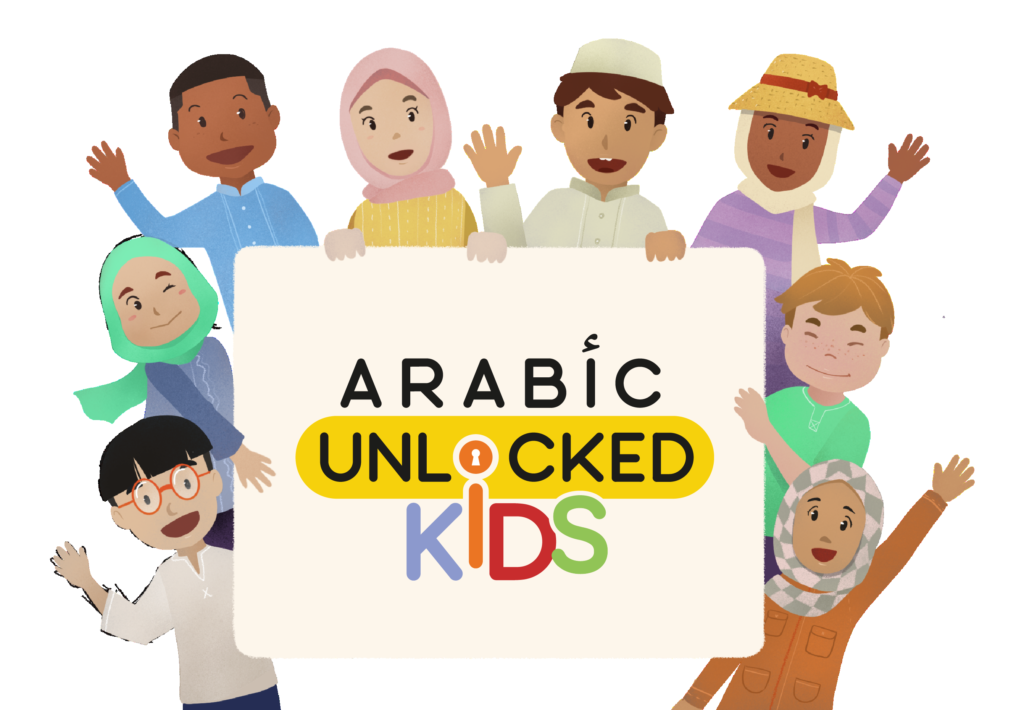
Jazakumullah khairan.

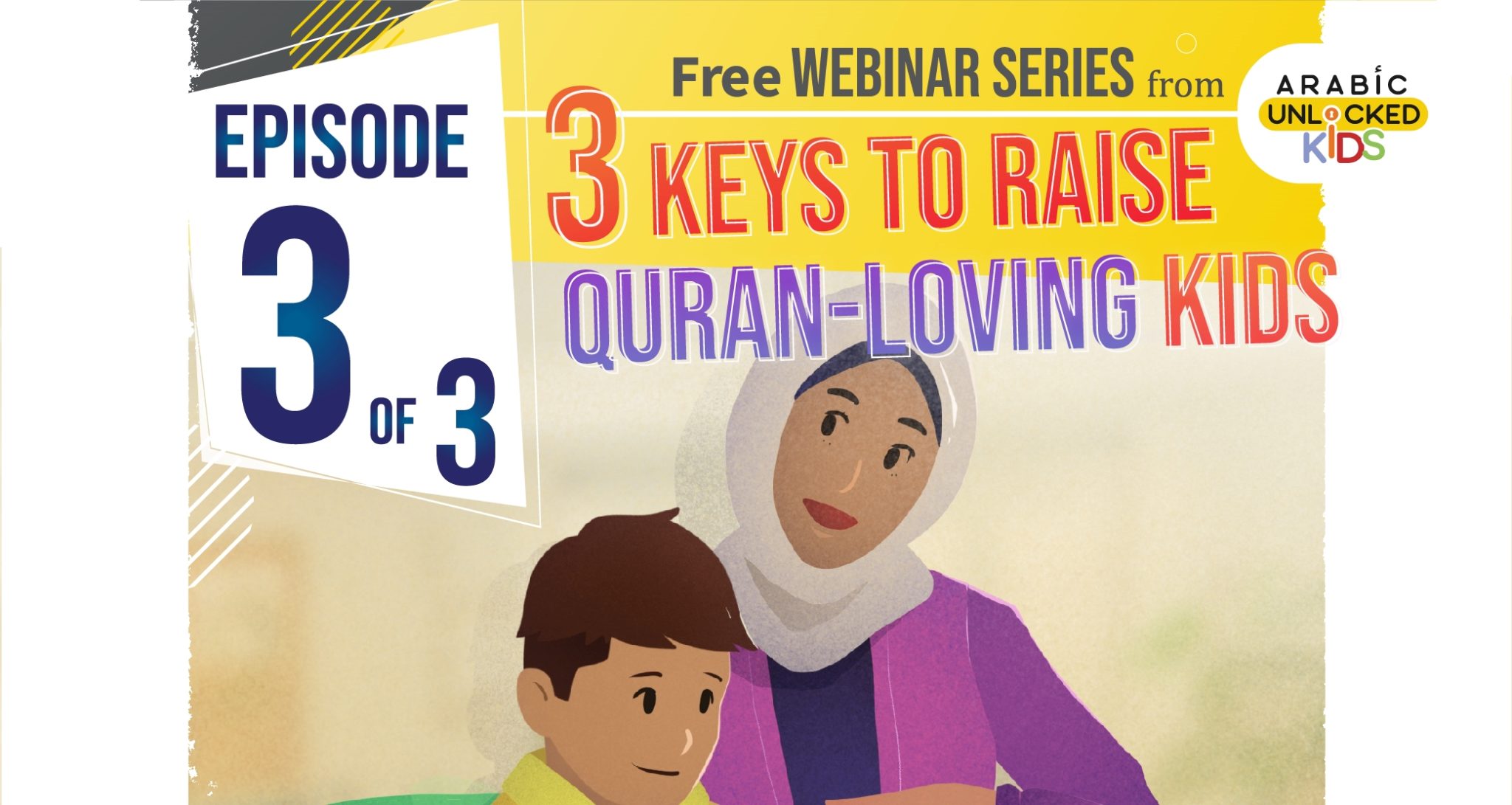
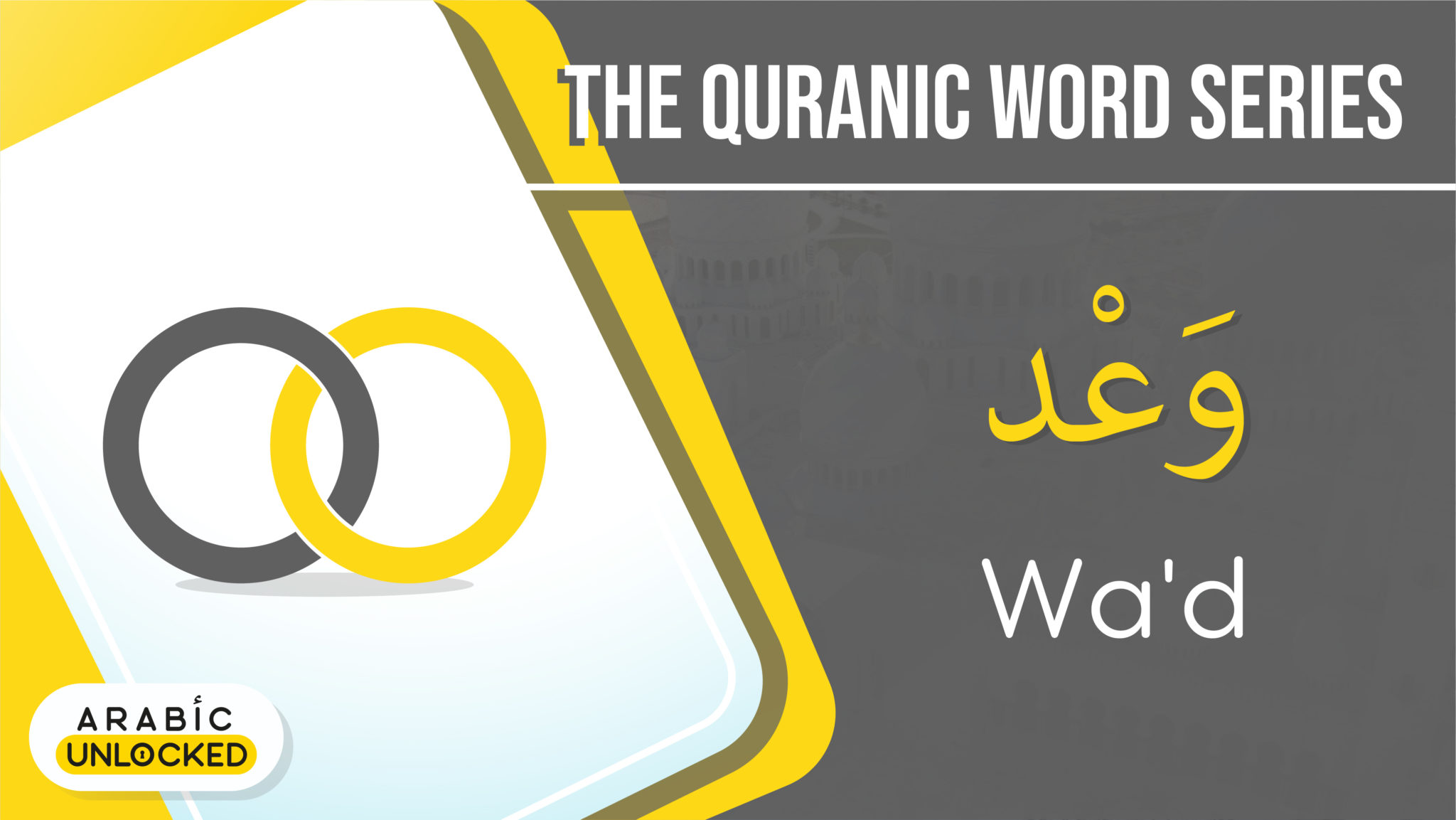
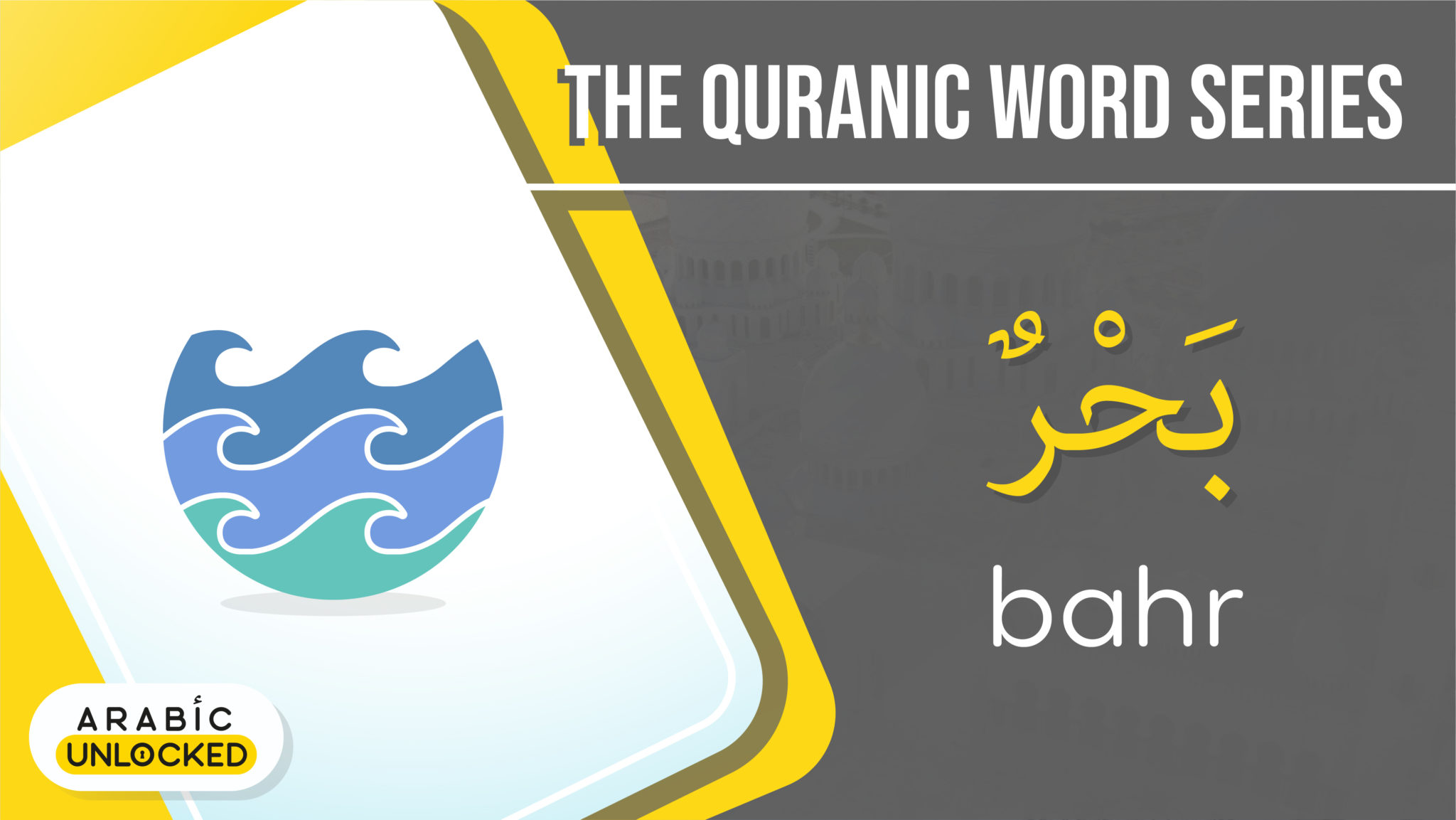
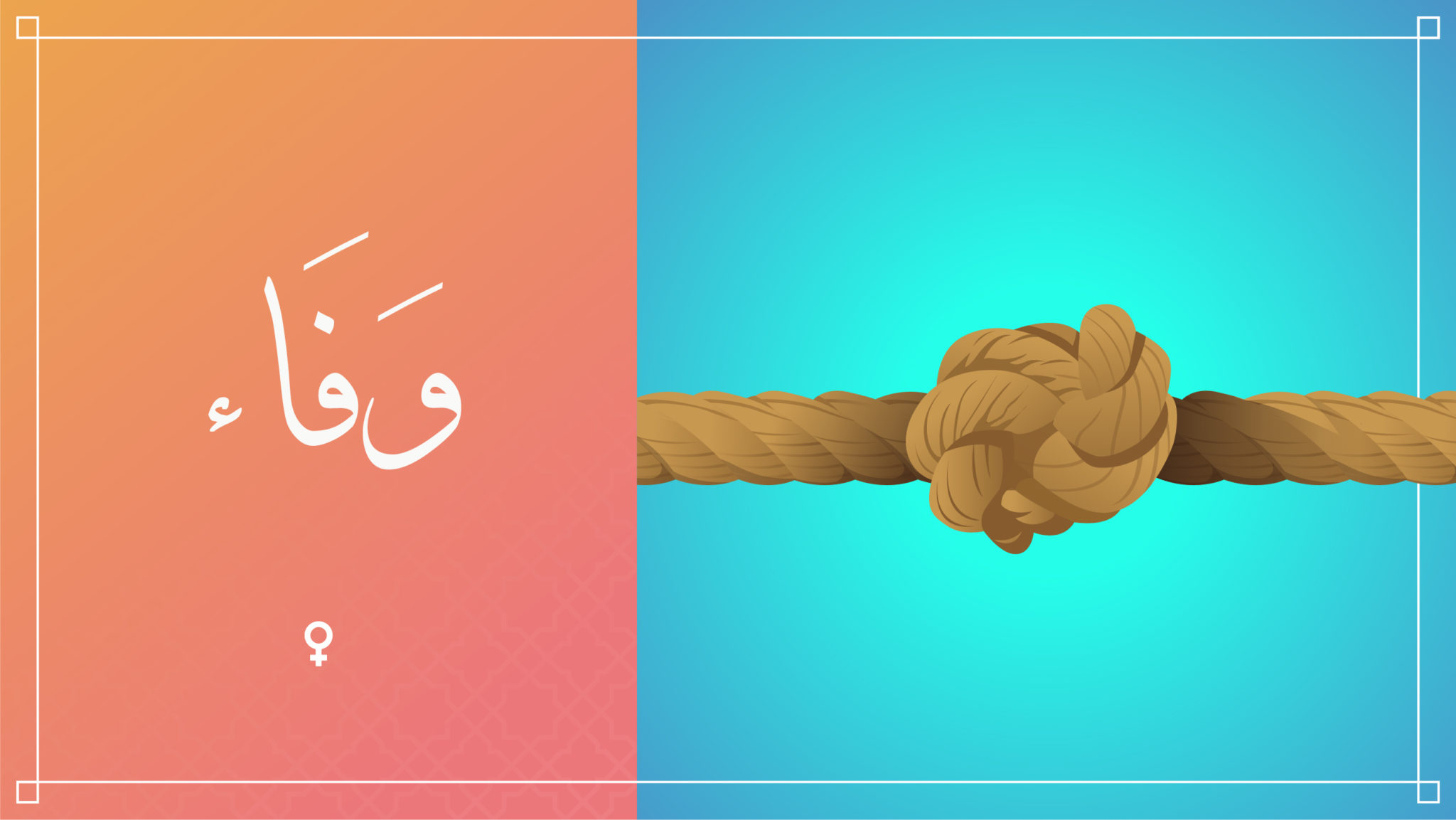

0 Comments